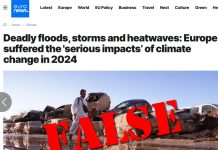The BBC, among other mainstream media outlets, published a story today claiming climate change has caused a 500 percent increase in extreme weather events over the past 50 years. This is wrong. According to the Sixth Assessment Report (AR6) from the Intergovernmental Panel on Climate Change (IPCC), released in early August, data show little discernable increase in most extreme weather events during the past fifty years, much less a substantial human influence on the number or severity of extreme weather events.
In a story, titled “Climate change: Big increase in weather disasters over the past five decades,” the BBC writes:
“The number of weather-related disasters to hit the world has increased five-fold over the past 50 years, says the World Meteorological Organization [WMO].”
“The number of weather, climate, and water extremes are increasing and will become more frequent and severe in many parts of the world as a result of climate change,” said WMO Secretary-General Prof Petteri Taalas.
“That means more heatwaves, drought and forest fires such as those we have observed recently in Europe and North America. We have more water vapor in the atmosphere, which is exacerbating extreme rainfall and deadly flooding. The warming of the oceans has affected the frequency and area of existence of the most intense tropical storms,” he added.
The WMO must not be looking at the same data as the IPCC because the IPCC reports there has been no discernable increase in most extreme weather events. And of the extreme weather events that the IPCC is highly confident it is extremely likely have increased, the IPCC is less confident it can definitively link the increase to climate change.
The WMO claims flooding has increased due to climate change. The BBC uncritically parrots this claim. The IPCC disagrees. It writes, “the frequency and intensity of heavy precipitation have likely increased at the global scale over a majority of land regions with good observational coverage,” but …, “heavier rainfall does not always lead to greater flooding.”
Concerning flooding, the IPCC writes, “Confidence about peak flow trends over past decades on the global scale is low, … there is low confidence in the human influence on the changes in high river flows on the global scale.”
The WMO also asserts incidences of drought have increased globally, yet the IPCC finds no consistent evidence for an increase in drought. The IPCC lists four separate categories of drought: hydrological, meteorological, ecological and agricultural. According to IPCC there is limited evidence climate change has increased the number, duration, or intensity of hydrological or meteorological droughts, and it has only medium confidence that it has “contributed to changes in agricultural and ecological droughts and has led to an increase in the overall affected land area.”
Even for ecological and agricultural drought, the data is a mixed bag. The IPCC, divides the world into 47 separate regions of study when analyzing drought trends, suggesting ecological and agricultural drought may have increased during the period of modest warming in 12 of those 47 regions. But in only two of those regions does the IPCC have even “medium confidence” for any human role in the observed increase. For the remaining regions experiencing a possible increase in droughts, the IPCC has low confidence human activities have had any discernable impact.
The WMO asserts warmer oceans are driving more intense tropical storms, contradicting what the IPCC concluded in in AR6. “There is low confidence in most reported long-term (multidecadal to centennial) trends in TC frequency- or intensity-based metrics,” said the IPCC.
University of Colorado’s Roger Pielke, Jr. analyzed the AR6 in detail, writing,
“[I]t is simply incorrect to claim that on climate time scales the frequency or intensity of extreme weather and climate events has increased for: flooding, drought (meteorological or hydrological), tropical cyclones, winter storms, thunderstorms, tornadoes, hail, lightning or extreme winds (so, storms of any type).”
There is only one fact upon which the WMO and the BBC have been completely honest and that is that deaths related to extreme weather events have declined dramatically over the past 50 years.
For instance, as reported on Climate Realism here, deaths tied to extreme temperatures have fallen by hundreds of thousands of people globally just since 2000. Another Climate Realism post cites data showing deaths related to all extreme weather events have declined by more than 99 percent over the past 100 years.
Unless the WMO has access to data the IPCC doesn’t, the fact is that the number and intensity of most extreme weather events has not increased during the recent period of modest warming. And for those that have worsened, it is an open question to what extent human induced climate change has contributed to the increase.



















“. . the IPCC is less confident it can definitively link the increase to climate change.”
And if they could make that link, it would be an even great leap of faith (not to mention science) to link it to man-made climate change – the view that some bit of additional GW, AGW, is altering the more powerful and consistent natural climate changes.